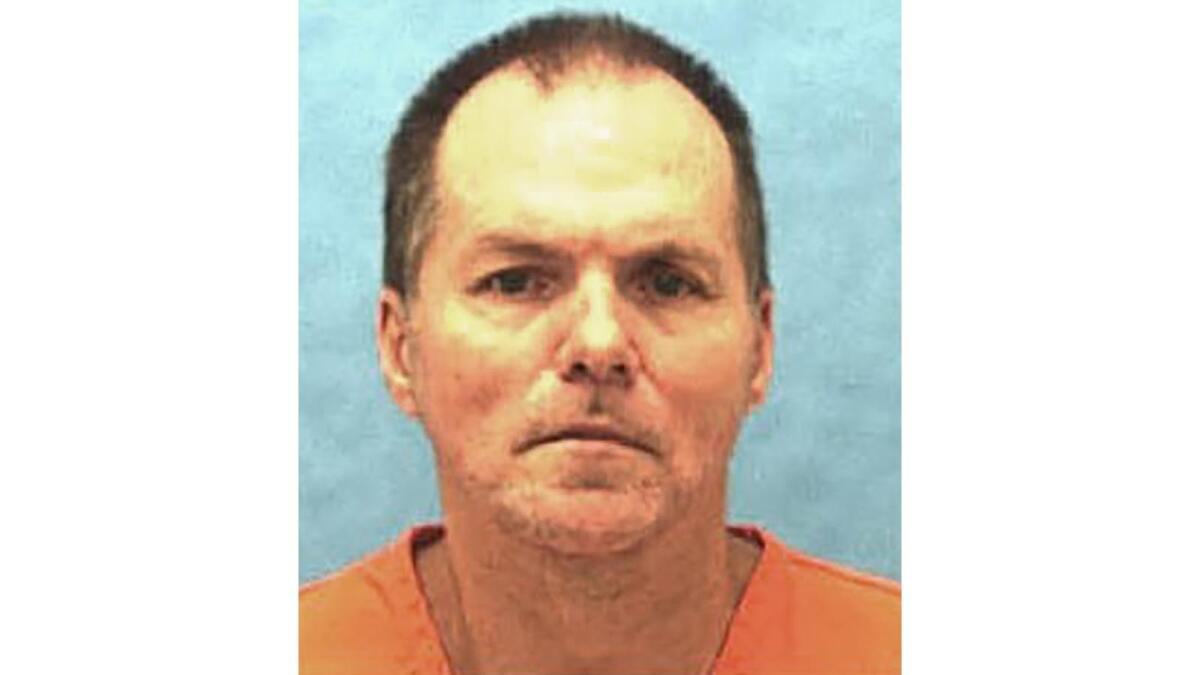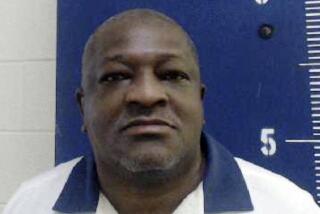In racially charged case, Florida carries out its first execution since early 2016

In the four decades since Florida reinstated the death penalty, the state had never executed a white man for the murder of a black victim.
That changed Thursday at 6:22 p.m. when Florida used a controversial cocktail of lethal injection drugs to execute 53-year-old Mark James Asay for a 1987 double murder that prosecutors say was racially motivated.
The case was riddled with legal challenges.
In 1988, after a jury split 9 to 3 on whether Asay deserved to die, a judge sentenced him to death under a sentencing provision that early last year the U.S. Supreme Court ruled unconstitutional.
Executions had been on hold in Florida since that ruling, which said the state’s system of capital sentencing invested too much power in judges and too little in juries, violating the 6th Amendment.
Asay’s attorneys argued that the state’s new death penalty statute should be applied to their client. But their request for a stay was denied this month by the Florida Supreme Court.
And in a bizarre wrinkle, the Florida Supreme Court announced in a ruling 10 days before the execution that it had mistakenly identified one of the victims as a black man.
“We have previously described the victim born Robert McDowell as ‘a black man dressed as a woman,’” the court said. “Renee Torres née Robert McDowell may have been either white or mixed-race, Hispanic but was not a black man. We regret our previous error.”
Asay’s attorneys argued in a petition last week that the mistake entitled him to a new hearing because the case against him was “built on a theory of racial animus towards blacks.”

Robert Dunham, executive director of the Death Penalty Information Center, a nonprofit group in Washington, D.C., that monitored the case, said the sentence was unfairly imposed and therefore unconstitutional.
“Florida prosecutors misrepresented the role of race in the killing in order to obtain the death sentence,” he said.
But this week the Florida Supreme Court disagreed, ruling that the error “does not negatively affect this court’s final determination.”
The manner of the execution also came under scrutiny at a time when Florida and other states are struggling to find chemicals to be used in lethal injections.
Asay became the first death row inmate to be executed with Florida’s controversial new three-drug cocktail, a combination of etomidate, rocuronium bromide and potassium acetate.
His attorneys argued that the state’s adoption of etomidate as the first drug in the lethal injection protocol puts him at substantial risk of serious harm, in violation of the 8th Amendment. But the Florida Supreme Court ruled that Asay failed to demonstrate that the state’s new drugs are likely to cause “serious illness and needless suffering.”
One of the justices, Barbara Pariente, disagreed. “In its rush to execute Asay, the state has jeopardized Asay’s fundamental constitutional rights and treated him as the proverbial guinea pig of its newest lethal injection protocol,” she wrote in a dissenting opinion.
The murder victims were Robert Lee Booker, a black man, and Robert McDowell, also known as Renee, a cross-dresser who was white or Latino.
At Asay’s trial, witnesses testified that the night of the murders Asay was drinking and shooting pool at Jacksonville bars with his brother, Robbie, and a friend, “Bubba” McQuinn. After the bar closed, McQuinn suggested that they go downtown to find prostitutes.
Downtown, Asay spotted his brother in his truck talking to Booker, according to testimony. Asay called Booker the N-word, pointed a finger in his face, pulled a gun from his back pocket and shot him in the abdomen. The bullet perforated his intestines and an artery, causing him to die of internal hemorrhaging.
McQuinn, who fled with Asay in his truck, testified that when he asked Asay why he shot Booker, he used the N-word to explain that it was to show him “who is boss.”
Asay and McQuinn continued to look for prostitutes, eventually finding McDowell, apparently unaware that he was a man dressed as a woman. After driving to a nearby alley, Asay stood watch outside. Suddenly, as McDowell started to get into the truck with McQuinn, Asay grabbed McDowell’s arm, pulled him from the truck and shot him six times.
In a recent interview with a Jacksonville TV channel, Asay admitted he killed McDowell during what he called a drunken “meltdown,” but insisted he did not kill Booker.
He also maintained he was not a white supremacist, saying he had had African American friends throughout his life.
Asay covered himself in swastikas and “supreme white power” tattoos, but he said in the interview that was only so he could “blend in” within a Texas prison at the age of 19.
“They are not representative at all of who I am, but they are tattoos, and they’re not easily removed,” he said.
Since Florida reinstated the death penalty in 1976, the state has executed 28 black death row prisoners, 20 of whom had at least one white victim, according to the Death Penalty Information Center. Of the 56 white death row prisoners who have been executed before Thursday, none had black victims.
Nationwide 20 white defendants have been executed for murdering black victims, and as many as 288 blacks have been put to death for killing whites.
Death penalty opponents have long cited racial disparities in the use of capital punishment, noting that the most reliable predictor of whether someone will be sentenced to death is the race of the victim.
Jarvie is a special correspondent.
ALSO
Arkansas carries out its first execution since 2005
Ohio puts child killer to death in first execution in 3 years
Missouri governor halts planned execution of Marcellus Williams after DNA questions
UPDATES:
7:35 p.m.: This article was updated with details about the murders and the legal questions surrounding the execution.
This article was first published at 4:05 p.m.
More to Read
Start your day right
Sign up for Essential California for news, features and recommendations from the L.A. Times and beyond in your inbox six days a week.
You may occasionally receive promotional content from the Los Angeles Times.







